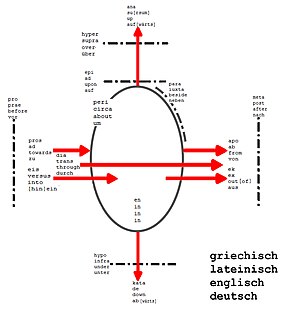
Back Voorvoegsel Afrikaans سابقة Arabic Prefixu AST Ön şəkilçi Azerbaijani Pangater BAN Прыстаўка (мова) Byelorussian Прыстаўка (мовазнаўства) BE-X-OLD Представка Bulgarian উপসর্গ (ব্যাকরণ) Bengali/Bangla Rakger Breton

| Affixes |
|---|
| See also: |
A prefix is an affix which is placed before the stem of a word.[1] Particularly in the study of languages, a prefix is also called a preformative, because it alters the form of the word to which it is affixed.
Prefixes, like other affixes, can be either inflectional, creating a new form of a word with the same basic meaning and same lexical category, or derivational, creating a new word with a new semantic meaning and sometimes also a different lexical category.[2] Prefixes, like all affixes, are usually bound morphemes.[1]
English has no inflectional prefixes, using only suffixes for that purpose. Adding a prefix to the beginning of an English word changes it to a different word. For example, when the prefix un- is added to the word happy, it creates the word unhappy.
The word prefix is itself made up of the stem fix (meaning "attach", in this case), and the prefix pre- (meaning "before"), both of which are derived from Latin roots.
- ^ a b Wilson 2011, p. 152–153.
- ^ Beard, Robert (1998). "She Derivation". The Handbook of Morphology. Blackwell. pp. 44–45.